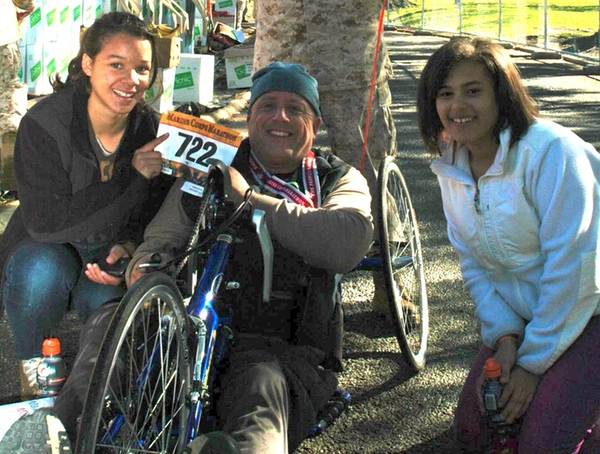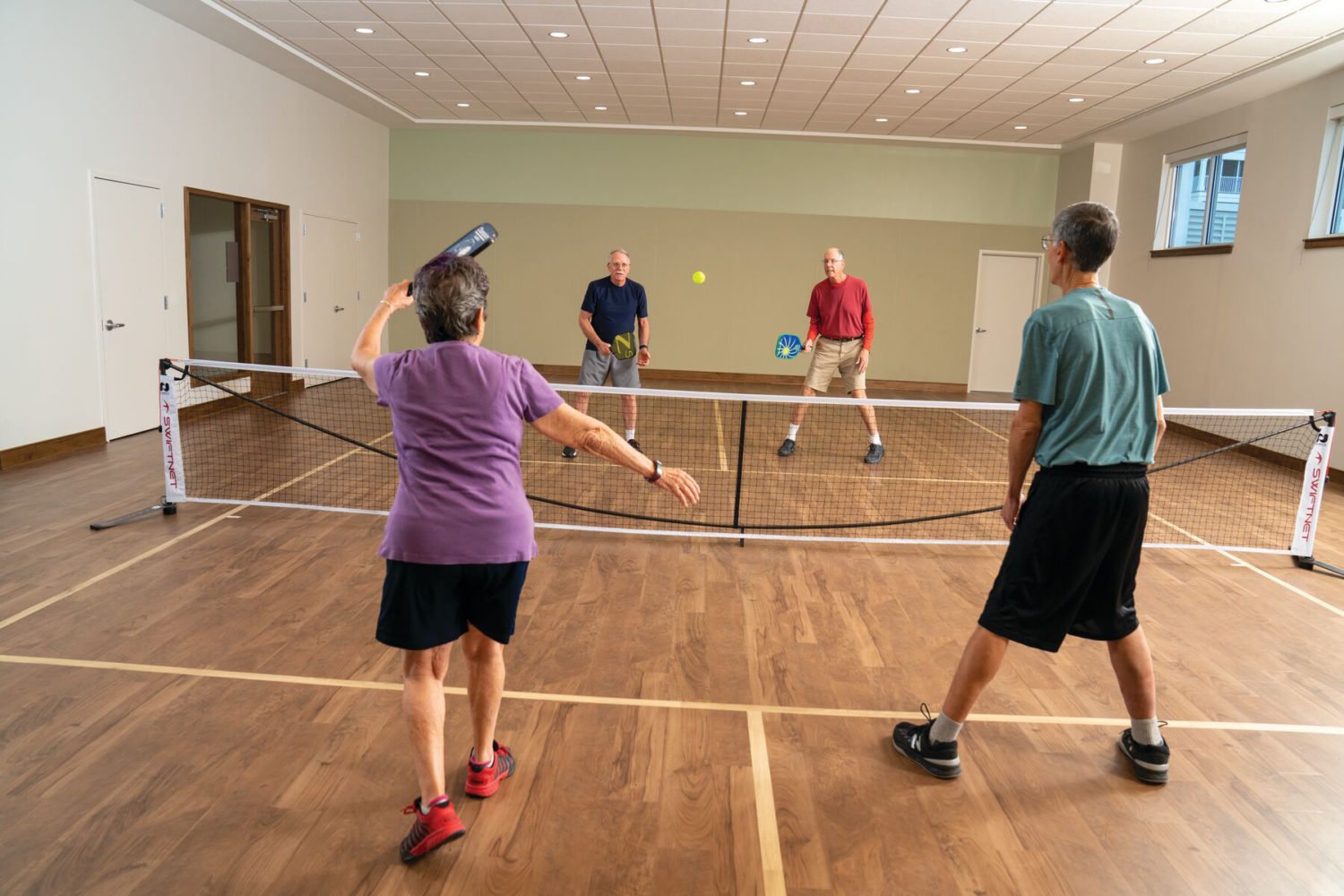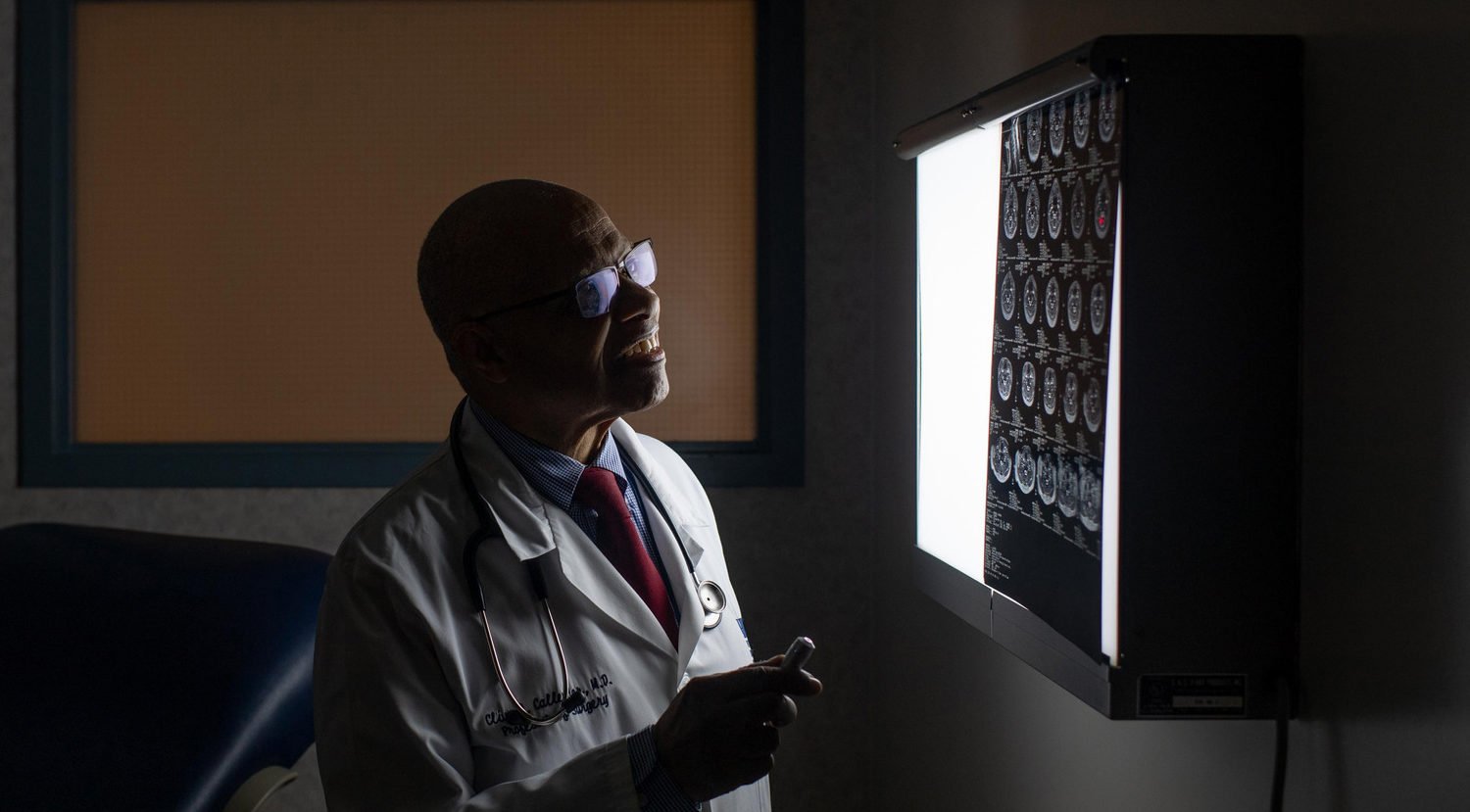Tom Pitsenberger with some of his family after completing the Marine Corps Marathon last Sunday. Photograph courtesy of MarathonFoto
Tom Pitsenberger never expected to be a marathoner.
Two years ago, a traumatic fall paralyzed him from the waist down. This past Sunday, the 49-year-old hand-cranked a recumbent bicycle 26.2 miles to finish DC’s 36th annual Marine Corps Marathon with a time of 2:38:21.
“I was hoping to do a marathon at some point, but the accident pushed those plans back a little bit,” Pitsenberger says.
In September 2009, Pitsenberger—who owns Deanwood Decks, a contracting company in Bethesda—was cutting branches from a tree when he blacked out and fell nearly 30 feet. The impact shattered his T12 vertebra and ruptured his spinal cord. While he still has some feeling and movement in parts of his right leg, his left side is fully paralyzed below the navel.
After two weeks in a Baltimore trauma center, Pitsenberger was transferred to Adventist Rehabilitation Hospital in Rockville, where he learned how to deal with the daily burdens of being paralyzed. Five weeks later, Adventist released him into outpatient therapy. On his first day, his doctor asked him about his goals for the program.
“I said I didn’t really have any,” Pitsenberger recalls. “So he asked me, ‘Do you think you’ll be able to walk again?’”
“I don’t know. Probably not,” he told the doctor. “But right there he put together this device for me to use, and I was walking that same day.”
Of the six months he spent as an outpatient, Pitsenberger says, “It was an uphill battle. It was really hard to see the progress. But my family was tremendous.” What also helped, he says, is that he has always been project-oriented: He sets objectives, identifies the tasks to accomplish, and checks them off when he’s finished.
Like learning to walk again, for example. On October 25, Pitsenberger completed his last round of physical rehabilitation at Adventist. Working with an elite team of physicians and therapists, he strengthened his legs and developed the muscle memory that enables him to walk with the support of carbon-fiber braces.
While he was still in therapy, he had the idea to train for the Marine Corps Marathon. He received a $3,000 grant from the Challenged Athletes Foundation, a California-based nonprofit that helps give physically disabled people opportunities to participate in sports. Pitsenberger used the money to buy a 27-speed racing bike.
It took time to learn the technique, he explains. “You have to lean into the turns. You have to reach down to shift with one hand while you keep cranking with the other.” But, the former avid biker and runner says, “It came pretty naturally.”
Before his accident, Pitsenberger had struggled with the grim realities of working as a contractor in a nearly stagnant housing and construction market. “I was falling into a trap,” he says. “I had started to think this was all I could do and I shouldn’t expect any more. In a way, it was killing me.” But the injury precipitated a serious reevaluation. “It was clear, even in those first two or three days, that this was what I needed. Maybe this sounds corny, but I believe this was what was supposed to happen.”
For one thing, he says, it’s put him back in a role he had shied away from in recent years: “Being a father to my children—each of them. But I love it. I love being there. It’s like it was providential. It drew my family back together.” Pitsenberger has 12 children; the oldest recently graduated from the University of Maryland, and the youngest was born shortly after his accident, while he was in inpatient care at Adventist.
Several of his children were there to cheer him on at the finish of the marathon. But five miles from the end, one of his back tires went flat. The bike slowed to a stop. “It took a lot to get it moving again on that last hill,” he recalls. “But I was able to lean to one side and keep it rolling pretty well. There was no coasting. I was cranking all the way through.”
“He was ecstatic,” says Aaron, one of Pitsenberger’s sons. “We didn’t know his tire had gone out till after the race, but you could tell he was so proud.
Pitsenberger, continues Aaron, is an exceptional person. “He never lets something hold him down, especially if he’s passionate about it. This was a way for him to show us he was still pushing forward, that he still has the mentality to achieve.”
Have an inspiring health or fitness story to share? We want to hear it. E-mail us at wellbeing@washingtonian.com, and you could be featured in an upcoming column.













